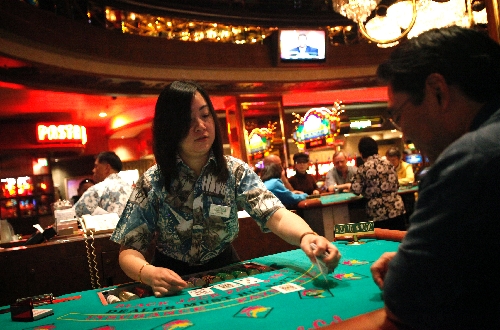Investors don’t buy Boyd’s optimism

Boyd Gaming Corp. management’s upbeat outlook for the coming year did little to make believers on Wall Street.
The company’s fourth-quarter results, said president and CEO Keith Smith during a conference call with analysts on Tuesday, provided "further evidence that our core business is improving. … This optimism is driven not only by our fourth-quarter results, but also by encouraging signals in both national and Las Vegas economies."
Yet the stock price dropped steadily after the remarks, closing down 7.3 percent at $9.91. The description that several analyst reports applied to Boyd’s performance was "stabilization," reflecting the view that revenues and profits did not seem to be deteriorating further.
"While we acknowledge that the Las Vegas results have certainly stabilized, we think that some investors were looking for growth that has yet to materialize," added Brian McGill of Janney Montgomery Scott, in a note to investors.
Analyst Steven Wieczynski of Stifel Nicolaus Capital Markets, who also wrote that the worst seems to have passed, still lowered his earnings estimates for the next three quarters based on "a slower than anticipated recovery in the Las Vegas locals market and continued overall market declines in Atlantic City."
The fourth-quarter net revenues after promotional allowances of $551.9 million rose 43.4 percent from 2009, but only because the revenues from Borgata in Atlantic City were not formally included in 2009. With Borgata included both years, revenues declined 1.5 percent, as gaming revenue dropped and promotional allowances went up.
The net loss of $7.1 million, or 8 cents a share, was a drop from the $1 million loss, or 1 cent per share, in 2009. Borgata was a part of both numbers.
The average of 17 analysts polled by Yahoo Finance estimated the loss at 5 cents a share.
Operating profits and income tax credits rose in 2010 but were offset by a sharp rise in interest payments that resulted from one-time charges that came with restructuring the company’s debt load.
A 2 percent decline in net revenues at the Las Vegas locals casinos was the best performance the company has managed in 12 quarters. Rising attendance at Las Vegas conventions was not only reflected by a 15 percent gain in the company’s meeting sector but spillover room bookings from mega events such as the International Consumer Electronics Show in January.
"We are also encouraged by early signs of a broader recovery in the Las Vegas market," Smith said, citing factors such as rising taxable sales.
In addition, the "unusually aggressive" advertising and promotional campaign unleashed in February by rival Station Casinos did not put a dent in the locals properties, said Executive Vice President and Chief Operating Officer Paul Chakmak.
However, wrote Wieczynski, "We continue to believe that the re-emergence of Station Casinos (from Chapter 11 bankrupcty) poses a direct threat to (profit) margins in the locals segment."
The Fremont Street properties also experienced declines in both revenues and operating profits. Although the company said its market share increased, in part because the Plaza closed for renovations, rising fuel costs for the flights it charters for Hawaiian residents increased expenses. The California Hotel, in particular, is marketed to people in Hawaii.
The company played down the effects to date of rising fuel prices beyond the charter flights, but some could crop up soon. Chakmak said gasoline prices would make little difference for locals.
People who drive from Southern California will have to spend more to get here, he said, but "I think (effect is) maybe more psychological than actual, real dollars associated with deciding whether to make a trip."
However, he continued, future marketing efforts will likely include promotions involving gasoline prices.
In Atlantic City, Boyd faces a situation all too familiar on the Strip: new rooms opening at a faster clip than visitor growth.
Coupled with increasing competition from nearby casinos in places such as eastern Pennsylvania, Smith said, "what Atlantic City needs in the short term is not more capacity, it needs more demand."
Boyd this year will launch a $50 million renovation of Borgata, which it operates and half owns with MGM Resorts International.
For the year, Boyd net revenues increased 30 percent to $2.1 billion without Borgata, the way the numbers are formally reported, but dropped 7 percent with Borgata. Net income rose 143 percent to $10.3 million, or 12 cents a share.
Contact reporter Tim O’Reiley at toreiley@reviewjournal.com or 702-387-5290.